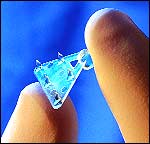-Dear editor:
Cosmetic surgery of the vulvar and vaginal anatomy has been in the public eye for nearly 2 decades. Innovative gynecologists took the expertise gleaned from years of restoring form and function damaged by childbirth, surgery, and disease to develop aesthetically focused options for the female genital region. Growing in tandem with both social media and a rising interest in cosmetic procedures as a whole, the demand for these procedures soon exceeded the supply of experts available to perform them. Training programs emerged, as did various criticisms of this new branch of gynecology due, in part, to rogue practitioners indiscriminately and inappropriately applying their skills. As such, we saw an immediate need to bring experts and interested professionals together. International Society of Cosmetogynecology organized the first two Global Symposia on Cosmetic Vaginal Surgery in January and
September 2010.
There is nothing comical about a plastic surgeon who proclaims to gain expertise in novel procedures—in this case, cosmetic vaginal surgery—developed in another specialty (gynecology) merely by “over-the-shoulder” guidance from a casual acquaintance outside of that specialty and a trial-and-error approach. Yet, in the August 2012 issue of Plastic Surgery Practice, Christine Hamori, MD, a plastic surgeon, did just that. In her eyes, a self-professed proficiency, casual undocumented training, and reading some papers on how to do labiaplasties and other cosmetic vaginal procedures are apparently all the requirements needed to perform cosmetic vaginal surgery. She said that she did not think gynecologists should perform aesthetic surgery of the external genitalia.
Gynecologic surgeons are as good or better than any plastic surgeon at using fine suturing with an aesthetic eye. They are experts in microsurgery, minimally invasive advanced laparoscopic and robotic surgery, minilaparotomy, laparotomy, complex pelvic reconstructive surgery, vaginal surgery for the management of congenital malformations of external genitalia and uterus, reconstruction of external genitalia following cancer, trauma, radiation, creation of neovaginas, urogynecology surgery … to name just a few.
Having spent a considerable part of our careers and years of training, developing, performing, teaching and repairing aesthetic, functional, and pathologic issues of the entire female genital tract, we have seen the entire spectrum of outcomes of both cosmetic and therapeutic vaginal surgeries. External genitalia structures are not decorative aesthetic features of the female anatomy that are devoid of function. No mercy will be displayed by patients, medical boards, malpractice insurance carriers, and plaintiff attorneys when functional damage as a result of these procedures occurs in the hands of those whose qualifications are limited to self-professed proficiency and casual undocumented training.
We were disappointed that the author of the article failed to contact any cosmetic gynecologic surgeon to report an accurate perspective on the topic. After all, in the past PSP has published several articles on cosmetic vaginal surgery written by cosmetogynecologists, and she should not have had difficulty in interviewing at least one of them.
Marco A. Pelosi III, MD
Marco A. Pelosi II, MD
Founders, International Society of Cosmetogynecology
PSP editor responds: “This was a single sourced article/interview based on a presentation at a medical meeting. It was not a feature article which, of course, would include multiple voices, viewpoints, and sources.
Dr Hamori was kind enough to sit down with me and discuss vaginal plastic surgery for readers who were unable to attend the meeting.”
Christine Hamori, MD, responds: “I would like to apologize for any inference I may have made concerning gynecologists and their training in aesthetic procedures of the female external genitalia. There are certainly many gynecologists and urologists who perform beautiful labiaplasties. However, it has been my experience over the past 10 years and more frequently in the past few months that women are concerned with the labiaplasty results done by gynecologists. The labia minora are frequently over-resected and even completely amputated in these cases. I would encourage gynecologists to take Dr Pelosi’s course in cosmetic vaginal rejuvenation and learn his tried-and-true techniques.
As for the continuing education of plastic surgeons, I will continue to teach my well-attended courses in cosmetic gynecology at our society meetings and look forward to speaking at the seventh annual Congress of Aesthetic Vaginal Surgery later this month.”



